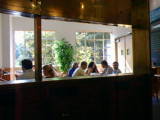
The information available in books is “static”, whereas the information available on the internet is regularly updated, thus the need to change our relationship to knowledge.
In 1996, more and more computers connected to the internet were available in schools and at home. Teachers began exploring new ways of teaching. Going from print culture to digital culture was changing the way both teachers and students were seeing teaching and learning. Print culture provided “stable” information whereas digital culture provided “moving” information.
During a conference organized by the International Federation of Information Processing (IFIP) in September 1996, Dale Spender, a professor and researcher, gave a lecture on “Creativity and the Computer Education Industry”, with insightful comments on forthcoming trends. Here are some excerpts:
“Throughout print culture, information has been contained in books — and this has helped to shape our notion of information. For the information in books stays the same — it endures. And this has encouraged us to think of information as stable — as a body of knowledge which can be acquired, taught, passed on, memorized, and tested of course. The very nature of print itself has fostered a sense of truth; truth too is something which stays the same, which endures. And there is no doubt that this stability, this orderliness, has been a major contributor to the huge successes of the industrial age and the scientific revolution. (…)
But the digital revolution changes all this. Suddenly it is not the oldest information — the longest lasting information that is the most reliable and useful. It is the very latest information that we now put the most faith in — and which we will pay the most for. (…)
Education will be about participating in the production of the latest information. This is why education will have to be ongoing throughout life and work. Every day there will be something new that we will all have to learn. To keep up. To be in the know. To do our jobs. To be members of the digital community. And far from teaching a body of knowledge that will last for life, the new generation of information professionals will be required to search out, add to, critique, ‘play with’, and daily update information, and to make available the constant changes that are occurring.”
Robert Beard, a professor at Bucknell University, in Lewisburg, Pennsylvania, wrote in September 1998: “As a language teacher, the web represents a plethora of new resources produced by the target culture, new tools for delivering lessons (interactive Java and Shockwave exercises) and testing, which are available to students any time they have the time or interest — 24 hours a day, 7 days a week. It is also an almost limitless publication outlet for my colleagues and I, not to mention my institution. (…) Ultimately all course materials, including lecture notes, exercises, moot and credit testing, grading, and interactive exercises will be far more effective in conveying concepts that we have not even dreamed of yet.” (NEF Interview)
Russon Wooldridge, a professor at the Department of French Studies, University of Toronto, Canada, wrote in February 2001: ” My research, conducted once in an ivory tower, is now almost exclusively done through local or remote collaborations. (…) All my teaching makes the most of internet resources (web and email): the two common places for a course are the classroom and the website of the course, where I put all course materials. I have published all my research data of the last 20 years on the web (re-edition of books, articles, texts of old dictionaries as interactive databases, treaties from the 16th century, etc.). I publish proceedings of symposiums, I publish a journal, I collaborate with French colleagues by publishing online in Toronto what they can’t publish online at home. In May 2000, I organized an international symposium in Toronto about French studies enhanced by new technologies. (…) I realize that without the internet I wouldn’t have as many activities, or at least they would be very different from the ones I have today. So I don’t see the future without them.” (NEF Interview)
The Massachusetts Institute of Technology (MIT) officially launched its OpenCourseWare (OCW) in September 2003 to put its course materials for free on the web, as a way to promote open dissemination of knowledge. In September 2002, a pilot version was available online with 32 course materials. 500 course materials were available in March 2004, 1,400 course materials in May 2006, and all 1,800 course materials in November 2007, regularly updated then, with some of them translated into Spanish, Portuguese and Chinese with the help of other organizations. MIT also launched the OpenCourseWare Consortium (OCW Consortium) in November 2005, as a common project for educational institutions that were willing to offer free online course materials, with the course materials of 100 universities worldwide one year later.
Copyright © 2011 Marie Lebert
ToC :: Next article: eBooks: 1997 – The multimedia convergence